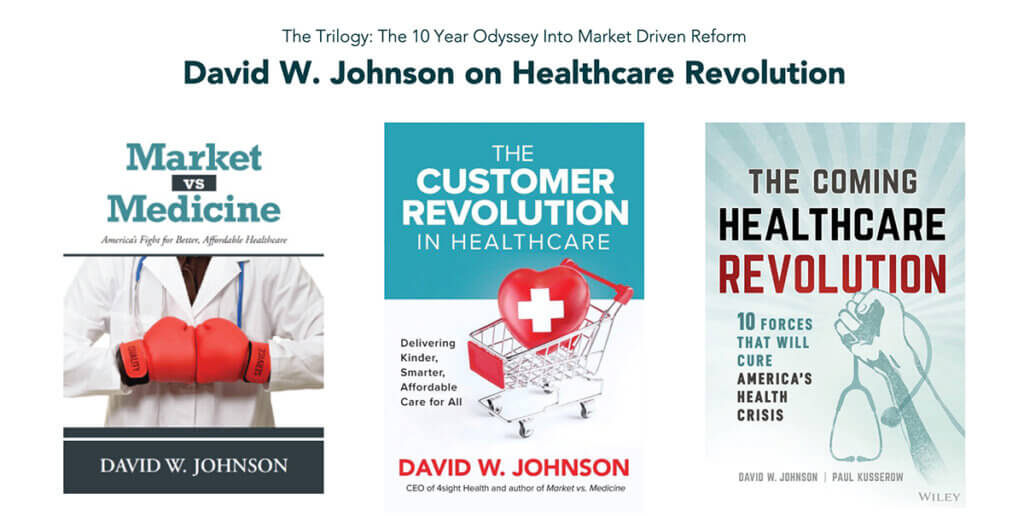September 9, 2025

Cut the BS Healthcare
Author’s note: This commentary summarizes my five-part series titled “Consumerism, Revenue Cycle and U.S. Healthcare.” Here is a link to that series.
In the late 1990s, my wife Terri and I were in London. While there, we spent a Saturday morning at the large and bustling Portobello Road Market. While perusing the stalls, I stumbled across a small English needlework piece from the early 1800s. Stitched in colorful letters is the phrase, “Hypocrisy is the homage vice pays to virtue.”
A modern phrasing would read “Hypocrisy is the tribute vice pays to virtue.” In other words, there would be no need to be hypocritical except for the very human desire to appear virtuous when doing bad things. I loved the needlework piece, bought it and brought it back home to Chicago. Its reflection on hypocrisy appeals to my skeptical, sometimes cynical attitude toward human motivations and behaviors.
Duplicity with a Gift Card
A letter I received recently from a concerned reader named Sara P. reminded me of the “hypocrisy” needlework piece. She had read a commentary I published in February 2025 titled, “Undue Duplicity: The False Promise of Phantom Medical Debt Relief.” The commentary reveals the hypocrisy underlying the promises of a nonprofit company named Undue Medical Debt. Essentially, the company retires outstanding medical debt that healthcare providers have already forgiven.
As is typical with Undue Medical Debt, Sara received a letter celebrating the erasure of a small, already-forgiven medical bill from over 10 years ago. The letter made her angry and worried, as she describes.
 Mr. Johnson,
Mr. Johnson,
I read the above article (“Undue Duplicity”) and wanted to let you know I received a letter from Undue Medical Debt yesterday (8/16/25). It made me very angry. The reason is I have been retired for a little over 7 years. The letter discussed an amount of money that was forgiven for me ($63.50) from a large healthcare company in MN where I received healthcare services and worked prior to retirement.
After reading your article I want to point out the thing that really makes me mad. Undue Medical Debt must have received my name, address and medical information in order to even send me a letter when they purchased that write off money from the healthcare system. My address is no longer in MN, as I retired in WI in 2018. So, they indeed received information from that healthcare company in MN that I did not authorize and it scares me. Now I’m worried about who else will use that information to find out my personal details even though they claim in the letter my healthcare details are considered secure.
The letter also asks that they be contacted for confirmation I received the letter and have a chance to win a $100 Amazon gift card. Yikes!!
Please advise any course of action I can take to help my situation.
Thank you,
Sara P.
Sara’s experience is a textbook example of BS healthcare. Like Sara, most Americans have experienced some form of BS healthcare firsthand. U.S. healthcare’s greatest sin is that it doesn’t see human beings at the end of its transactions. Instead, industry incumbents see a procedure, a diagnostic, a treatment code and a bill. End-users (sometimes called patients, consumers or customers) are an afterthought within a massive and monstrous treatment, billing and collection system.
Even more maddening is that healthcare incumbents wrap themselves in virtue as they deliver substandard outcomes at excessively high costs. “Patients first” is nothing more than a hypocritical tagline. U.S. healthcare cannot “cure” itself until its practices match its promises. Trust, value and transparency are the tools that healthcare companies must apply to reform themselves. Until then, BS healthcare will dominate the landscapes of every American community.
As the U.S. healthcare industry weathers disruptive transformation, companies that “solve” end-users’ health and healthcare “jobs to be done” will “win” in the marketplace. They will do it the old-fashioned way — by earning consumers’ trust, respect and confidence; by offering necessary services at competitive prices with great service. Woe unto those organizations that ignore consumers.
Consumers, Revenue Cycle and U.S. Healthcare
For most of my career, I was a healthcare investment banker serving large nonprofit health systems. In this professional capacity, I led over $30 billion in bond financings, spearheaded several mergers and acquisitions and advised on sophisticated asset-liability management strategies. By 2014, I couldn’t take it anymore. My work was contributing to the overbuilding of U.S. healthcare’s acute care footprint. It was time to do something else. In June 2014, I launched 4sight Health as boutique healthcare media and advisory company.
Without realizing it, I was embarking on a 10-plus-year odyssey into the complex and convoluted connectivity between the marketplace and delivery of healthcare services. That included publishing the three following healthcare policy books:
- “Market vs. Medicine” (2016)
- “The Customer Revolution in Healthcare” (2019)
- “The Coming Healthcare Revolution” (2024 with Paul Kusserow)
It really wasn’t until writing “The Coming Healthcare Revolution” with Paul Kusserow that I began to fully appreciate the scale and malignance of healthcare revenue cycle operations — the dark underbelly of U.S. healthcare that determines who pays how much to whom for which services provided. It’s a massive, under-reported-upon industry that rivals commercial banking in size.
Mastering the intricacies of healthcare revenue cycle led me to understand why the industry treats its consumers, like Sara, so badly. Consistently bad customer experience is a recipe for extinction in other consumer-facing industries. Historically, this has not been true in healthcare
“Volume over value” is shorthand for healthcare business practices that optimize revenues rather than strive for high-value outcomes. Lost within this relentless scramble for revenues are patients. They are necessary to generate treatment codes and bill for services. Far too often, the relationship ends there. In volume-based business models, customer experience and treatment outcomes are secondary considerations.
Zeroing in on healthcare’s lousy customer experience exposes the industry’s inherent hypocrisy. No matter what healthcare organizations say, it is impossible for them to serve consumers appropriately when their business models prioritize revenue generation and profits over customer experience.
As a full-time author, I write to understand complex topics. In my experience, good writing leads to good thinking, not the reverse. As post-COVID healthcare jettisoned hard-won innovations and reverted back to value-depleting business practices, I wanted to better understand the motivations driving the bad behaviors of incumbent healthcare organizations. With this in mind, I began writing commentaries about healthcare revenue cycle and consumerism for HFM magazine. The experience was revealing.
The deeper I dug, the more apparent the contradictions and hypocrisy embedded within U.S. healthcare became. It also became crystal clear that the only strategies that will enable healthcare companies to escape the “volume” morass require embracing value and consumerism.
Hindsight has 20-20 vision. Five of my HFM commentaries from 2024 and 2025 form a coherent assessment of intricate relationships between healthcare companies and their end-users. 4sight Health has assembled slightly modified versions these HFM columns into a series on “Consumerism, Revenue Cycle and U.S. Healthcare.” It is available through this link.
Here are the five commentaries included in the series:
Part 1 – “GoFundMe Healthcare” This commentary explores the dystopian and usually unsuccessful journey that many Americans take to secure funding for healthcare procedures. That U.S. consumers fear paying healthcare bills more than contracting disease demonstrates the industry’s categorical neglect for its end-users.
Part 2 – “Undue Duplicity: The False Promise of Phantom Medical Debt Relief” Philanthropists, policy-makers and providers are desperate to find solutions to healthcare’s daunting medical debt crisis. As Sara’s experience demonstrates, this isn’t one of them.
Part 3 – “Revenue Cycle Dystopia: Olives With No Juice” The dramatic rise and fall of Olive AI highlights the inherent dysfunction and misplaced complexity embedded within revenue cycle operations. It also illustrates the dangers of automating systems without first fixing them.
Part 4 – “Revenue Cycle Euphoria: Logical Automation and Consumerism” In this commentary, I explore my personal journey to understanding the enormity and confounding intricacy of healthcare revenue cycle. Automation can’t solve the dilemma that providers want to receive more and insurers want to pay less, but it can make it easier and more understandable for consumers to meet their individual payment obligations.
Part 5 – “Consumerism Introduces Itself to U.S. Healthcare” Long neglected and under-appreciated, consumers are exercising more control over their healthcare decision-making. This is a boon for healthcare organizations striving to meet consumers’ needs, wants and desires. They will grow and prosper.
Consumer-driven disruption is coming to U.S. healthcare. Healthcare companies that internalize and act upon this belief will transform the industry and reconfigure its supply-demand dynamics. In the process, BS healthcare will cease to exist. The coming healthcare revolution will not tolerate hypocrisy. There will be no gap between what successful healthcare organizations say they’re doing and what they actually do.
The coming healthcare revolution will reward companies that deliver the health and healthcare services the American people want, need and increasingly demand. This is the American way.
Integrity Matters
From 1978 to 1991, Americans flocked around their TV sets on Friday nights to watch “Dallas,” a prime-time, larger-than-life soap opera. The show launched in the wake of the twin oil crises of the 1970s. It was a time when oil-producing Texas was riding high as the rest of the nation suffered through skyrocketing gas prices.
Through 357 episodes over 14 seasons, “Dallas” chronicled the escapades of the cattle-ranching and oil-drilling Ewing family, particularly those of the notorious J.R. Ewing played by Larry Hagman. Viewers couldn’t get enough of the show’s backstabbing, lust and greed. Americans loved to hate J.R., whose ruthlessness had a charming, almost playful veneer.
In February 1984, Terri and I watched “Dallas” episode 152 titled “True Confessions.” In this episode, J.R. blackmails a government official named Edgar Randolf to get inside information on offshore leasing bids. As J.R. puts the squeeze on Edgar, the following conversation ensues:
EDGAR: [Leans forward] I don’t see how you can live with yourself.
J.R.: Oh, it’s not hard. You’ll see. Once you give up integrity, the rest is a piece of cake. [Chuckles]
Terri and I laughed so hard that we almost spit out our drinks. She somehow found a framed copy of J.R.’s integrity quote and gave it to me as a present. After I purchased the “hypocrisy” needlework piece, I dug out the framed J.R. quote and hung them next to one another in my office.
The trouble with integrity is that once it’s lost, it’s almost impossible to get back. Still, people and organizations engage in hypocritical behaviors to preserve the appearance of integrity. Unfortunately, too many healthcare organizations have compromised their integrity. Despite saying otherwise, they tolerate suboptimal healthcare outcome and practice crappy customer service. They do this to increase revenues and profits.
Doing the right thing isn’t always easy, but it’s necessary to preserve individual and organizational integrity. It’s time to end BS healthcare and start delivering personalized, high-value care that delights end-users. Stop pretending otherwise. The path to salvation and increased market relevance comes from serving the needs of consumers every day through every single encounter.






